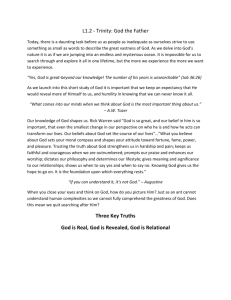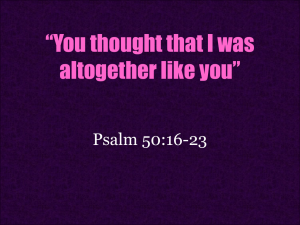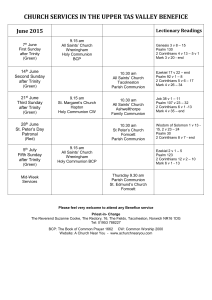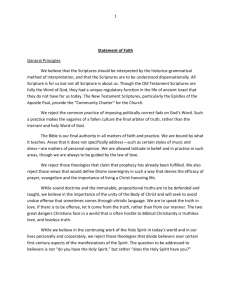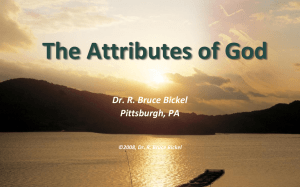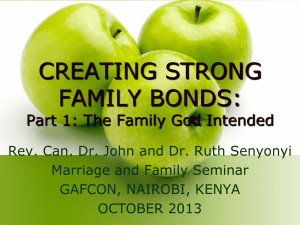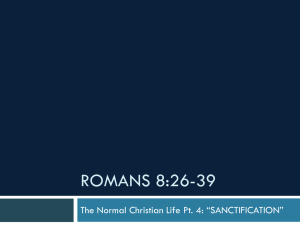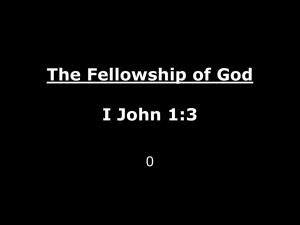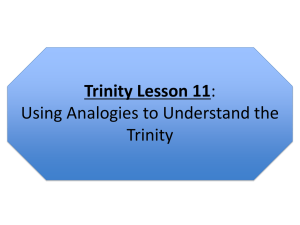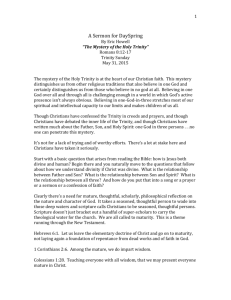The Doctrine of God - Bells Run Baptist Church
advertisement
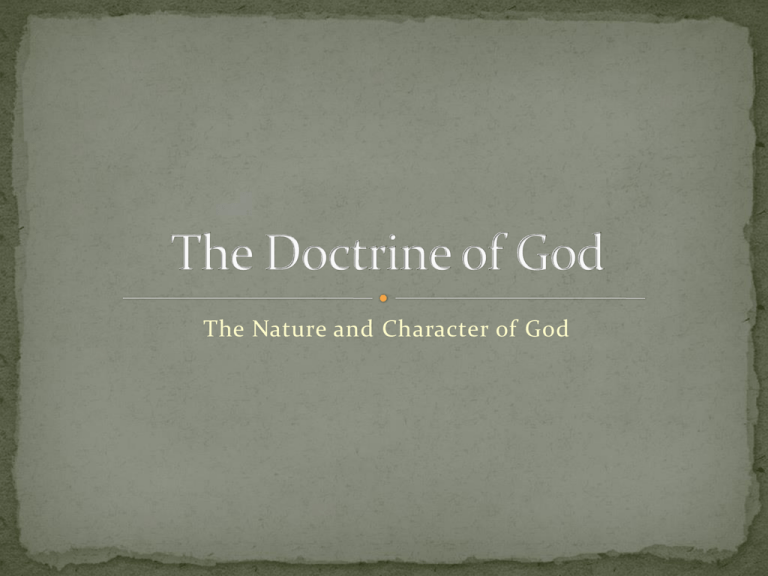
The Nature and Character of God It is the temptation and instinct of mankind to create in our own sinful minds a “god” that is the figment of our imagination. While Scripture teaches that we are made in the image of God (Genesis 1:27), we tend to want to create a god that is made in our image (Romans 1:23). As a result, the God of the universe is often wrongly depicted and understood in a way that is the exact opposite of His true being. It is for this reason that we began in chapter one by addressing the Word of God. The primary and only infallible basis, besides the general revelation of creation, that we have for understanding the person and character of God is what He has clearly told us about Himself in Scripture. We must be careful to make sure that we, independent of Scripture, are not defining God. God and God alone is capable of defining Himself. Everything that we say and believe about the character of God is rooted in Scripture alone. One of the greatest mistakes in the modern identity of God is to either over or under-emphasize any number of His attributes. It is true that God is love (1 John 4:16), but we fear that often the love of God is emphasized in such a way that His other, equally important attributes are dismissed, denied, or over-looked. Additionally, we understand that the love of God can only truly be grasped when it is joined to His: Holiness (Exodus 15:11, Psalm 29:2, Isaiah 6:3 ) Righteousness (Psalm 9:8, Psalm 89:14, Romans 1:17) Justice (Isaiah 30:18) Rather, He hates sin (Psalm 5:5-6) and will by no means clear the guilty (Exodus 34:7, Nahum 1:2-3). Additionally, God is all-powerful (Genesis 17:1), allknowing (Ezekiel 11:5, Acts 15:18), everywhere present (Jeremiah 23:23-24, Psalm 139:7-12, Amos 9:2-3), and He does not change (Malachi 3:6). At the same time, He is gracious, merciful, patient, abundant in goodness and truth, forgiving sin (Exodus 34:6-7) and a rewarder of those who diligently seek Him (Hebrews 11:6). One God in Three Persons In a careful study of Scripture, we quickly learn that one of the most important things that God has revealed about Himself is that while He is the one and only true God (Deuteronomy 6:4, 1 Corinthians 8:6), He uniquely exists in three persons. (Matthew 28:19, 2 Corinthians 13:14) This doctrine is most commonly referred to as the doctrine of the Trinity. In the Trinity, we see God the Father (John 6:46, John 20:17, Romans 15:6), God the Son (John 20:31, John 5:18, Matthew 11:27, John 10:30), and God the Holy Spirit (1 Corinthians 2:10-11, Romans 8:27, Genesis 1:2, John 14:16-17). In the Trinity, we also see equality of deity – that is, each Person of the Godhead is fully and completely God. (John 1:18, John 1:1, Colossians 2:9, Acts 5:3-4, 1 Corinthians 3:16) Jesus Himself claimed that He was one with His Father (John 10:30) and that Paul asserts Jesus Christ is the image of the invisible God (Colossians 1:15). Likewise, even Christ Himself was active in the creation of the world, thus indicating his eternality (Colossians 1:16). At the same time, the Spirit of God is not merely an inferior person in the Trinity. He is fully God, even as is the Father and the Son. (Acts 5:3-4) While we see equality in terms of deity, we see a distinction in terms of the roles among these members of the Trinity. For example, in terms of God’s plan for the salvation of sinners, God the Father sends God the Son to accomplish salvation, and God the Son lives and dies on behalf of those the Father gives him and fulfills the will of the Father (John 3:16, John 6:38). However, it was Christ the Son who obeyed His Father (John 6:38), took the form of a Servant (Philippians 2:8, Isaiah 52:13 – Isaiah 53:10), bore our sins on the cross (1 Peter 2:24, 2 Corinthians 5:21), and in so doing absorbed the wrath of His Father as our substitute (Isaiah 53:10). Following the resurrection of Christ (Matthew 28:1-10), it is the Spirit of God who has come to apply redemption to us by convicting us of our sin (John 16:8) and giving us the new birth (John 3:3-8) whereby we are enabled to repent of sin and place our faith in Christ. Here in our salvation and in many other places in Scripture, such as in creation(Genesis 1:1-2, 26, Colossians 1:16), we see all three persons of the Trinity present, performing different roles. God the Father is not the Son or the Spirit God the Son is not the Father or the Spirit God the Spirit is not the Father or the Son All are fully and equally God Confused? Welcome to the club. Within the Trinity, we see the perfect display of love and relationship (John 17:26). As a result, we must humbly recognize that God did not create mankind because He was lonely or needy. The fact is, prior to the creation of man, God was supremely joyful in the fellowship of the Trinity (Proverbs 8:27-30). Before creation he was not deprived (Psalm 50:9-15, Acts 17:25) of any additional glory that was not already present amongst His own Persons (John 17:1).
